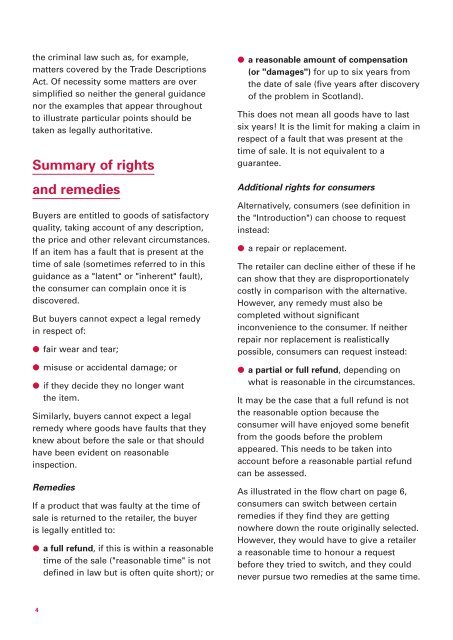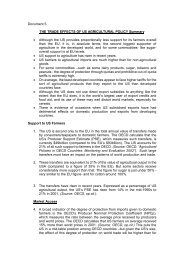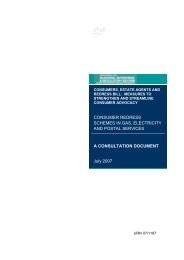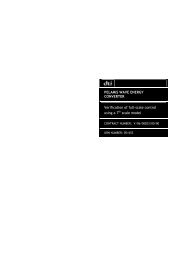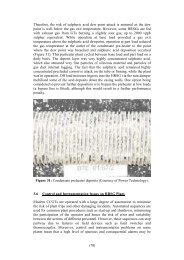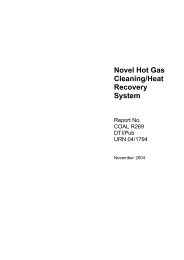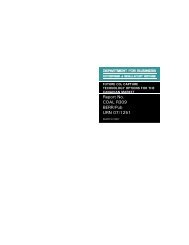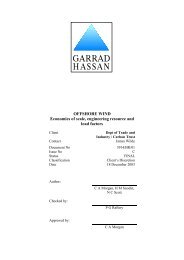A traders guide: the law relating to the - DTI Home
A traders guide: the law relating to the - DTI Home
A traders guide: the law relating to the - DTI Home
Create successful ePaper yourself
Turn your PDF publications into a flip-book with our unique Google optimized e-Paper software.
<strong>the</strong> criminal <strong>law</strong> such as, for example,<br />
matters covered by <strong>the</strong> Trade Descriptions<br />
Act. Of necessity some matters are over<br />
simplified so nei<strong>the</strong>r <strong>the</strong> general guidance<br />
nor <strong>the</strong> examples that appear throughout<br />
<strong>to</strong> illustrate particular points should be<br />
taken as legally authoritative.<br />
Summary of rights<br />
and remedies<br />
Buyers are entitled <strong>to</strong> goods of satisfac<strong>to</strong>ry<br />
quality, taking account of any description,<br />
<strong>the</strong> price and o<strong>the</strong>r relevant circumstances.<br />
If an item has a fault that is present at <strong>the</strong><br />
time of sale (sometimes referred <strong>to</strong> in this<br />
guidance as a "latent" or "inherent" fault),<br />
<strong>the</strong> consumer can complain once it is<br />
discovered.<br />
But buyers cannot expect a legal remedy<br />
in respect of:<br />
fair wear and tear;<br />
misuse or accidental damage; or<br />
if <strong>the</strong>y decide <strong>the</strong>y no longer want<br />
<strong>the</strong> item.<br />
Similarly, buyers cannot expect a legal<br />
remedy where goods have faults that <strong>the</strong>y<br />
knew about before <strong>the</strong> sale or that should<br />
have been evident on reasonable<br />
inspection.<br />
Remedies<br />
If a product that was faulty at <strong>the</strong> time of<br />
sale is returned <strong>to</strong> <strong>the</strong> retailer, <strong>the</strong> buyer<br />
is legally entitled <strong>to</strong>:<br />
a full refund, if this is within a reasonable<br />
time of <strong>the</strong> sale ("reasonable time" is not<br />
defined in <strong>law</strong> but is often quite short); or<br />
4<br />
a reasonable amount of compensation<br />
(or "damages") for up <strong>to</strong> six years from<br />
<strong>the</strong> date of sale (five years after discovery<br />
of <strong>the</strong> problem in Scotland).<br />
This does not mean all goods have <strong>to</strong> last<br />
six years! It is <strong>the</strong> limit for making a claim in<br />
respect of a fault that was present at <strong>the</strong><br />
time of sale. It is not equivalent <strong>to</strong> a<br />
guarantee.<br />
Additional rights for consumers<br />
Alternatively, consumers (see definition in<br />
<strong>the</strong> "Introduction") can choose <strong>to</strong> request<br />
instead:<br />
a repair or replacement.<br />
The retailer can decline ei<strong>the</strong>r of <strong>the</strong>se if he<br />
can show that <strong>the</strong>y are disproportionately<br />
costly in comparison with <strong>the</strong> alternative.<br />
However, any remedy must also be<br />
completed without significant<br />
inconvenience <strong>to</strong> <strong>the</strong> consumer. If nei<strong>the</strong>r<br />
repair nor replacement is realistically<br />
possible, consumers can request instead:<br />
a partial or full refund, depending on<br />
what is reasonable in <strong>the</strong> circumstances.<br />
It may be <strong>the</strong> case that a full refund is not<br />
<strong>the</strong> reasonable option because <strong>the</strong><br />
consumer will have enjoyed some benefit<br />
from <strong>the</strong> goods before <strong>the</strong> problem<br />
appeared. This needs <strong>to</strong> be taken in<strong>to</strong><br />
account before a reasonable partial refund<br />
can be assessed.<br />
As illustrated in <strong>the</strong> flow chart on page 6,<br />
consumers can switch between certain<br />
remedies if <strong>the</strong>y find <strong>the</strong>y are getting<br />
nowhere down <strong>the</strong> route originally selected.<br />
However, <strong>the</strong>y would have <strong>to</strong> give a retailer<br />
a reasonable time <strong>to</strong> honour a request<br />
before <strong>the</strong>y tried <strong>to</strong> switch, and <strong>the</strong>y could<br />
never pursue two remedies at <strong>the</strong> same time.


